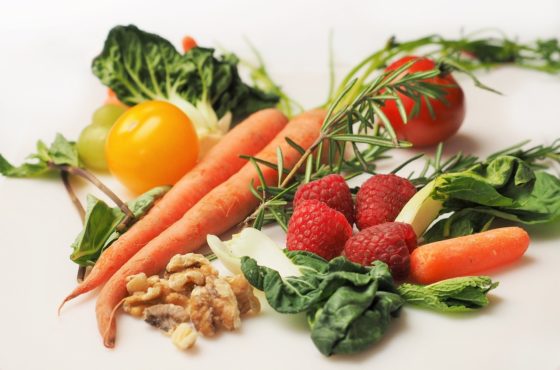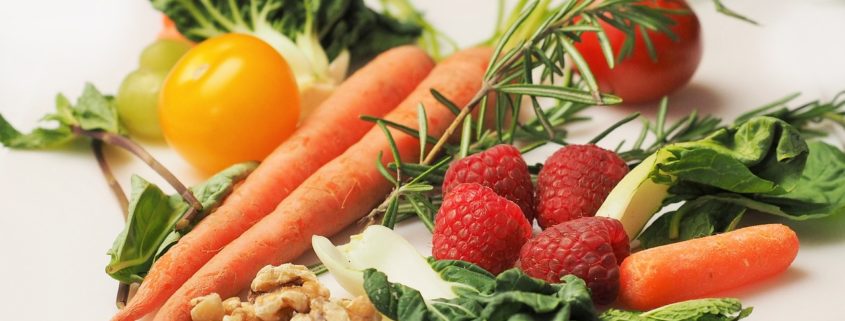Is a Vegan Diet Safe During Pregnancy?

Surprisingly, there are non-vegan foods that pregnant women should eliminate from their diets. Sushi and any fish containing high levels of mercury (like swordfish and ahi tuna) should not be on the menu. Instead, pregnancy calls for a carefully chosen array of whole foods. And yes, those foods can be vegan!
According to Dr. John McDougall, a general practitioner who has studied pregnancy nutrition since 1975:
Foods with the highest levels of chemical contamination are those that are high on the food chain: meat, poultry, fish, and dairy products.
So, should you steer clear of animal products and opt for a vegan diet instead? Possibly. But know that not all vegan diets are created equal. Below, we’ll go over what you need to know about how to be a vegan and have a healthy pregnancy, including getting the right amount of protein, calcium, iron, and B12, as well as the healthiest vegan foods for pregnant women.
Contents
What is a vegan diet, and what nutrients do I need?
First, it’s important to note that any vegan diet should be plant-based. There are endless vegan junk foods like Oreos, Pillsbury Crescent Rolls, and those decadent tubs of Duncan Hines chocolate icing. Tempting, but certainly not healthy — and they may actually increase the risk of ADHD in your developing baby.
A plant-based vegan diet consists of real foods like whole grains, fruits, vegetables, nuts, and beans. If you build a balanced diet around a few key vitamins and nutrients, a healthy vegan pregnancy may be possible.
Vegan Protein Sources for Pregnancy
Pregnant women require an extra 10 grams of protein per day for a daily total of 60 grams. Beans and nuts are two of the best sources of vegan protein for pregnant women. Those ingredients may not sound very exciting, but when you integrate them into healthy recipes, they can be both enjoyable and nourishing. Think black bean burritos with salsa and guacamole, cashew butter spread on oat bread, and a crisp spinach salad with chickpeas sprinkled on top.
Plus, vegan sources of protein are high in fiber, which eases one common pregnancy ailment: constipation. Animal sources of protein, however, contain no fiber at all and can contribute to constipation.
Some vegan proteins shouldn’t be on your plate. For example, soy in tofu and other processed foods often contains harmful chemicals. These chemicals can cause hormonal imbalances in women and the babies they’re carrying (especially baby boys). Stay safe with protein from unprocessed foods.
Vegan Calcium Sources for Pregnancy
It’s a myth that cow’s milk is the only source of calcium. Did you know that broccoli contains a whopping 74 mg of calcium per cup? Kale provides even more calcium per serving (139 mg) as do collard greens (357 mg). Cow’s milk offers similar or even higher amounts of calcium (approximately 300 mg per cup) but may also contain saturated fat, antibiotics, and synthetic hormones.
Furthermore, absorption levels differ between cow’s milk and vegetables. Some greens have calcium absorption rates of 50% or higher compared with 32% for cow’s milk.
Whether it’s from a tall glass of milk or a dish of steamed broccoli, calcium is crucial to build strong bones for your baby. Calcium also benefits the circulatory and nervous systems of unborn babies, so be sure to get at least 1,200 mg per day.
See also: Caffeine During Pregnancy: How Much is Too Much?
Vegan Iron Sources for Pregnancy
Iron is pivotal during pregnancy, as the body uses it to produce extra blood (hemoglobin) for your baby. Getting enough iron also protects against fatigue and anemia.
An iron-rich vegan meal might include lentil soup, roasted squash over brown rice, and a handful of candied pistachios for dessert. (Or maybe a bowl of coconut-milk pistachio ice cream? Why not?) Just read those labels and make sure you get the recommended 27 mg of iron per day.
Vegan B12 Sources for Pregnancy
This is a tricky one. Vitamin B12 is crucial to overall health. It boosts energy, strengthens the immune system, and can even naturally treat depression. If you’re aiming for a fit pregnancy, you’ll be glad to know that Vitamin B12 can help you burn up to 40% more fat. And how about getting those zzz’s? Vitamin B12 promotes restful sleep, too.
The catch? Vitamin B12 is only found in animal sources.
Vegans will need to turn to fortified foods such as breakfast cereals, almond milk, and nutritional yeast to get sufficient B12, or, your doctor may recommend a supplement as B12 is important for baby’s development. The good news is that Vitamin B12 is only helpful in small amounts. There have been studies, in fact, that warn of too much B12 and folic acid during pregnancy. According to one study, an excess of these vitamins has been linked to autism.
While it’s virtually impossible to monitor every morsel we put in our mouths, we can follow some basic advice that our moms gave us: everything in moderation. And when in doubt, always consult your doctor.
Top 5 Healthiest Vegan Foods for Pregnant Women
Ready to taste the vegan life? The following foods aren’t just healthy; they’re also delicious and some are especially beneficial for expectant mothers. Green leafy vegetables like kale, for example, supply a powerhouse of vitamins and minerals that will also strengthen your body post-pregnancy when you’re lactating.
1. Beans (garbanzo, black, kidney)
2. Whole Grains (quinoa, brown rice, oats)
3. Leafy Greens (kale, spinach, watercress)
4. Nuts (almonds, walnuts, cashews)
5. Seeds (sunflower, pumpkin, flaxseeds)
Should I go vegan while pregnant?
Try experimenting with tasty vegan recipes, but also do what feels best for your body. If you’re craving a tender, juicy steak, then your body might be trying to get you to fill a nutritional deficit.
The bottom line is to listen to your body and nourish it with the freshest, healthiest foods possible. Whether those foods come from plant or animal sources is a decision only you can make, and if you’re pregnant, it’s best to consult with your doctor before any major diet or lifestyle changes.
Good luck, and happy eating!
You may also be interested in:








Leave a Reply
Want to join the discussion?Feel free to contribute!